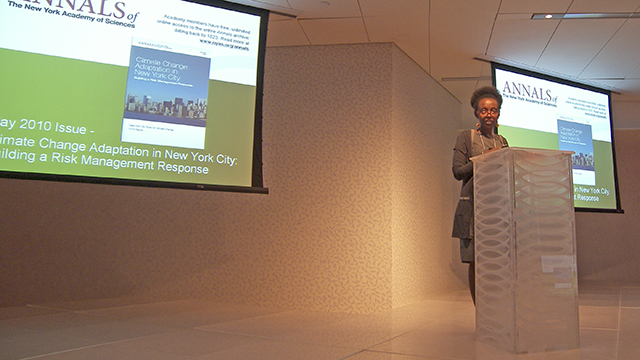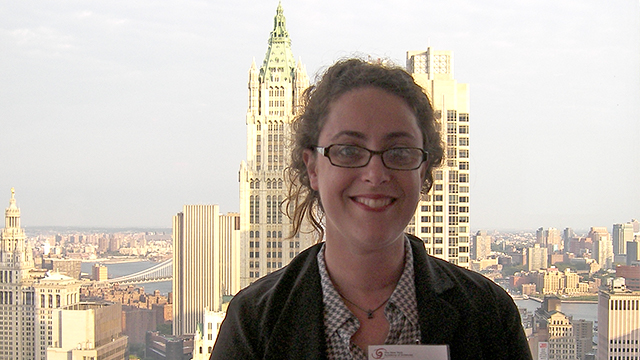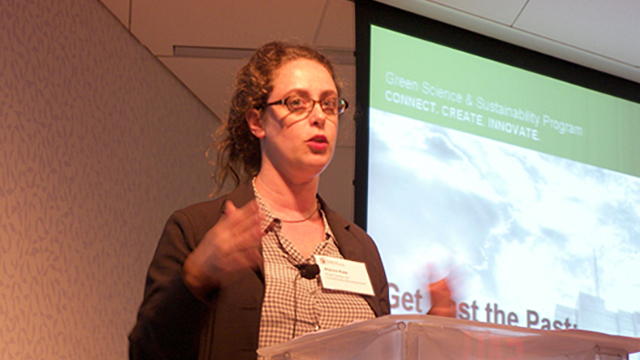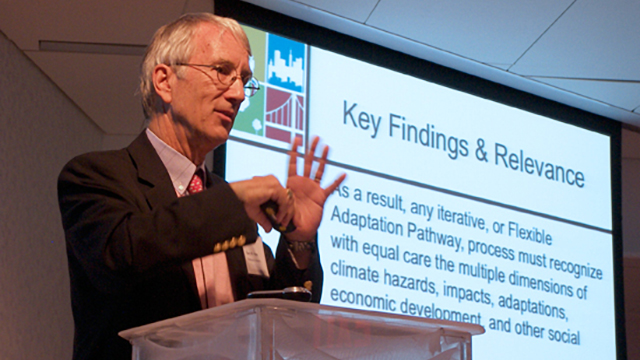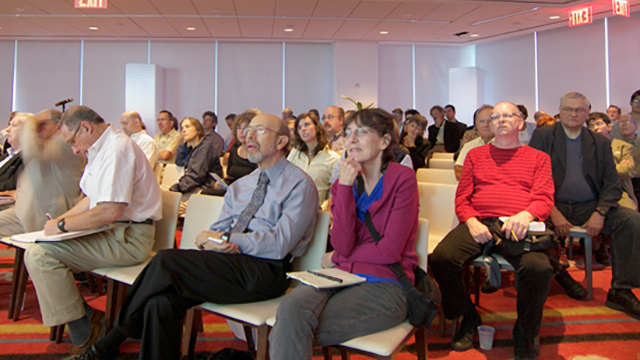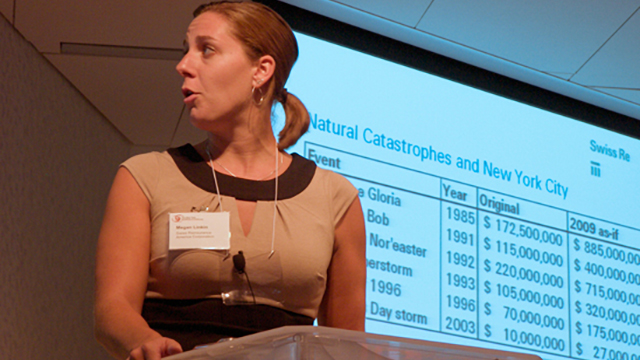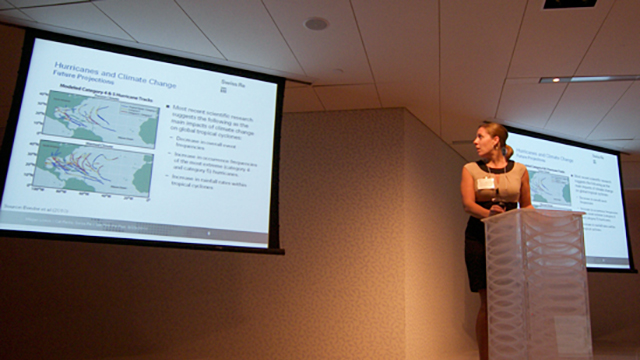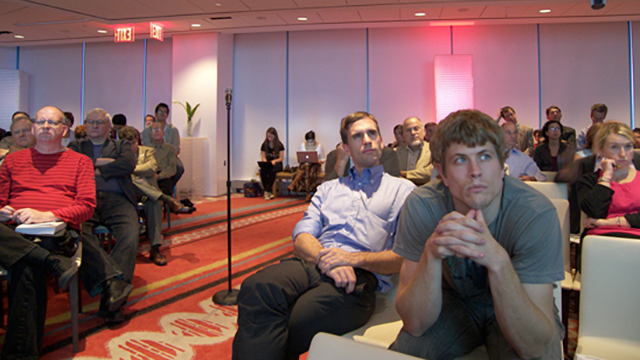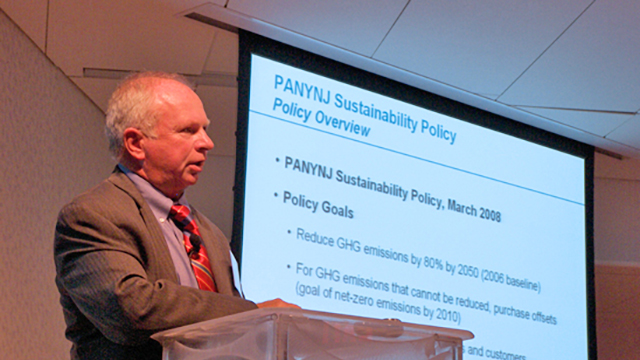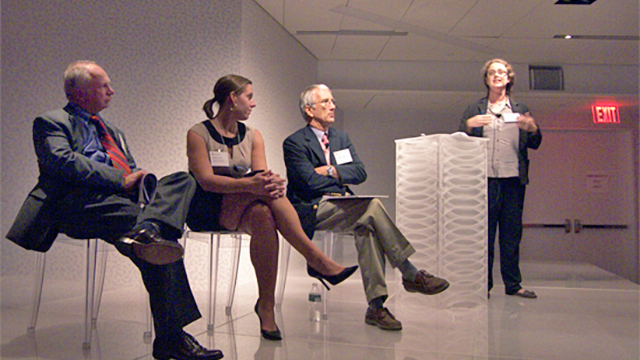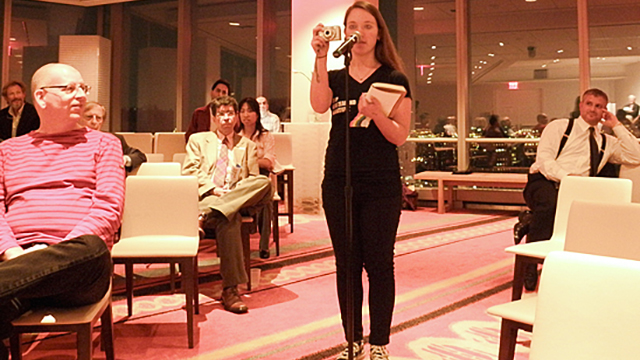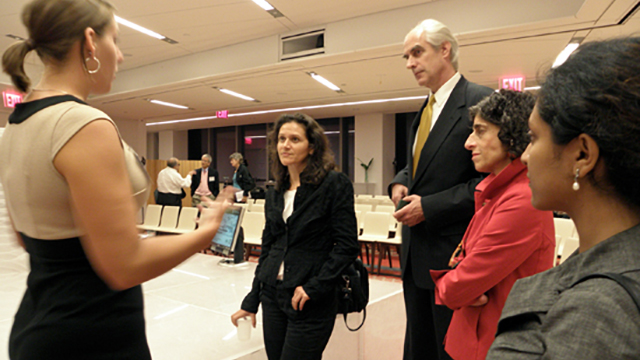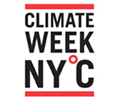Climate Change Adaptation In and Around New York City
Write-up
In partnership with the Sallan Foundation and Climate Week NYC, the New York Academy of Sciences hosted a panel discussion to explore how New York City should prepare for the impacts of climate change and improve the resilience of its critical infrastructure.
Climate change holds great uncertainties, but the fact of climate change is not in doubt. Cities in which more than half the world's populations now live are ever more at risk. The New York Metro Area—with its dense population, concentration of essential infrastructure systems, and high-value buildings—is particularly vulnerable. Today, City government, the Port Authority, and private insurers are developing risk management tools for identifying, assessing, and managing risks posed by climate change.
On the evening of September 23, 2010, experts Gary Yohe, a professor of economics at Wesleyan University, Megan Linkin of Swiss Reinsurance Corporation, and Christopher Zeppie of the Port Authority of New York and New Jersey, provided insights on how each of these stakeholder groups are thinking through complex climate adaptation issues—some of which are beyond the realm of past experience—and how decisions about adaptation are being made. This discussion followed from a New York City Panel on Climate Change (NPCC) report, Climate Change Adaptation in New York City: Building a Risk Management Response, which dealt with this subject matter in depth.
Gary Yohe, Professor of Woodhouse/Sysco Economics at Wesleyan University, outlined the methodology for developing an Adaptation Assessment Risk Matrix, a tool to inform city planners, officials, academics and scientists when making risk-management decisions regarding climate change policy. He stressed three major points that face NYC as we consider the implications of climate change. First, adaptation is not giving up on abatement; rather it works as part of a portfolio of responses to climate change. Second, the real threat to New York City will be increasingly frequent extreme events. Using complex modeling of low-probability, high-consequence weather events, Yohe demonstrated that an increase in storm surges may transform the "fifty year" storm into an event that occurs every twenty-five years. Third, it is essential for scientists, academics and experts from across sectors share information about climate predictions to keep risk-management modeling as accurate as possible.
Megan Linkin, Atmospheric Perils Specialist at Swiss Re explained why a reinsurance company would have a vested interest in a deep understanding of climate change, and how her work with catastrophe modeling can help New York City prepare for climate change. Currently, weather perils result in the highest aggregate loss in the insurance industry — primarily driven by increased exposure in vulnerable geographic areas. By modeling from weather data sets from pre-1900 to the present, Linkin was able to project a range of losses related to climate changes. She called on New York City to take a hard look at its assets and their location and create a loss/frequency curve that can be revised as more climate change data becomes available.
Christopher Zeppie, Director of the Office of Environmental and Energy Programs at the Port Authority of New York and New Jersey started with an overview of how the PANYNJ was formed as well as its current umbrella of jurisdictions and the programs the organization has implemented in an effort to adapt to climate change. Since over half of the PANYNJ facilities are vulnerable to climate change, the Authority already has undertaken an intense look at what actions can be immediately implemented by the Port Authority. Among the projects already underway: elevated structures gates at the WTC/PATH site to avoid flooding, purchase of $60 million of land to preserve open space in the Hudson Estuary and redundancy in many of LaGuardia Airport's systems to keep it running during heat waves. Zeppie emphasized that the PANYNJ domain encompasses a number of homeland security issues, which compounds the creativity needed to combat climate change at their facilities.
The panel moderator, Alyssa Katz of the Pratt Center took a wide range of queries from the audience, including questions on the impact of a carbon tax, the potential relocation of NYC residents and which adaptation issues are most important for citizen focus.
Participant Presentations and Resources
Official Event of Climate Week NYC 2010
- Climate Week NYC 2010
By providing an international platform for government, business and civil society to work together on low carbon solutions, CWNYC once again showed the world that organizations and individuals can play a pivotal role in advancing the debate, driving awareness, and keeping climate action at the top of the global agenda.
Event Co-sponsors
- NYAS Environmental Sciences Section and Green Science & Environmental Policy Discussion Group
- the Sallan Foundation
Event Moderator
- Alyssa Katz, Pratt Center for Community Development
Panel Participants
- Michel Wahome, (Introducer) NYAS Program Associate, NYAS
- Megan Linkin, Ph.D., (Panelist) Atmospheric Perils Specialist, Swiss Re
- Gary Yohe, Ph.D., (Panelist) Woodhouse/Sysco Professor of Economics, Wesleyan University
- Christopher R. Zeppie, (Panelist) Director of the Office of Environmental and Energy Programs, The Port Authority of New York and New Jersey
Links to Presentations (in order of appearance)
- Gary Yohe, Ph.D. — download Responding to Climate Change as a Risk-Management Issue: The NYC Approach PDF
- Megan Linkin, Ph.D. — download Climate Change Risk in New York City: The Viewpoint of an Insurer PDF
- Christopher R. Zeppie — download Adapting to Climate Change: Practical Strategies at the Port Authority PDF
NYAS Resources
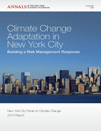
This year, the New York Academy of Sciences published Climate Change Adaptation in New York City: Building Risk Management Response written by the New York City Panel on Climate Change. This report will set the terms of metropolitan adaptation analysis for cities everywhere.
- Chapter 2: Adopting a risk-based approach (pages 29-40) was written by Gary Yohe and Robin Leichenko.
- Chapter 6: Insurance industry (pages 113-126) was written by Alice LeBlanc and Megan Linkin.
Blog Resources
Video Selects
The New York Academy of Sciences on vimeo
Speaker and Moderator Bios
Gary Yohe, Ph.D.
Wesleyan University
Gary Yohe is the Woodhouse/Sysco Professor of Economics at Wesleyan University; he has been on the faculty at Wesleyan for more than 30 years. He was educated at the University of Pennsylvania, and received his PhD in Economics from Yale University in 1975. He is the author of more than 100 scholarly articles, several books, and many contributions to media coverage of climate issues. Most of his work has focused attention on the mitigation and adaptation/impacts sides of the climate issue. He is a senior member of the IPCC that was awarded a share of the 2007 Nobel Peace Prize. Involved with the Panel since the mid 1990's, he served as a Lead Author for four different chapters in the Third Assessment Report that was published in 2001 and as Convening Lead Author for the last chapter of the contribution of Working Group II to the Fourth Assessment Report. In that Assessment, he also worked with the Core Writing Team to prepare the overall Synthesis Report; and he continues to work for the IPCC as it begins preparations for the Fifth Assessment Report that will be published in 2013. Dr. Yohe was also a member of the New York City Panel on Climate Change and currently serves on the standing Committee on the Human Dimensions of Global Change of the National Academy of Sciences. He also served recently on the National Research Council Committee on America's Climate Choices: Panel on Adapting to the Impacts of Climate Change as well as National Research Council Committee on Stabilization Targets for Atmospheric Greenhouse Gas Concentrations.
Megan Linkin, Ph.D.
Swiss Re
Megan Linkin, Ph.D. is the atmospheric perils specialist for Swiss Reinsurance America Corporation in Armonk, NY. Her primary responsibility is assessing the insurance risk posed by hurricanes, tornadoes, hail and winterstorms globally by the development of tools and techniques for underwriters and actuaries. She also provides real-time weather forecasts during impending catastrophic events and is one of Swiss Re's experts on climate change science. She is a regular presenter at the annual meetings of the American Meteorological Society and the American Geophysical Union and has manuscripts published in the Journal of Climate and Weatherwise magazine. Dr. Linkin received her Masters of Science in 2006 and Ph.D. in 2008 in atmospheric and oceanic science from the University of Maryland with her dissertation entitled "North Pacific Climate Variability and Arctic Sea Ice." She graduated magna cum laude from Rutgers University in 2004 with a Bachelor of Science in meteorology and a minor in mathematics. Dr. Linkin is an active member of the American Meteorological Society, American Geophysical Union, ReUnder40 and the New York City Panel on Climate Change. She currently resides in Manhattan.
Christopher Zeppie
The Port Authority of New York and New Jersey
Christopher R. Zeppie Sr. is Director of the Office of Environmental and Energy Programs at the Port Authority of New York and New Jersey. In that role, he is responsible for environmental compliance and sustainability as well as the energy agenda, including all matters related to the procurement of energy, energy efficiency, and renewable energy. Since coming to the Port Authority in 1979, Mr. Zeppie has held positions of increasing responsibility as; Manager, Permits and Governmental Approvals; Attorney, Environmental Law Division; Assistant Director, Office of Environmental Management; and Chief Environmental Policy Officer. He is a member of the Dean's Council, SUNY at Stony Brook, School of Marine and Atmospheric Studies, a member of the Advisory Committee of the Environmental Section of the New York Academy of Sciences, and a member of the Transportation Research Board's Committee on Climate Change and U.S. Transportation. Mr. Zeppie has been appointed by Mayor Bloomberg to serve on the Jamaica Bay Watershed Advisory Committee, and has represented the Port of New York and New Jersey at the C40 Conference working group on Port Facilities in Rotterdam and the C40 Aviation meeting in Los Angeles. Mr. Zeppie holds a B.S. degree in biology and ecology from Manhattan College, an M.S. degree in marine environmental science from State University of New York at Stony Brook, and a J.D. degree from St. John's University School of Law.
Alyssa Katz
Pratt Center for Community Development
Alyssa Katz is the author of Our Lot: How Real Estate Came to Own Us (Bloomsbury, 2009), about the political history of the housing bubble and mortgage crisis. She teaches journalism at New York University and writes for The American Prospect, The Big Money, Salon, Partnership for Sustainable Communities, Housing Watch, Mother Jones, The Next American City and other publications. Katz also works with the Pratt Center for Community Development, an organization that helps community-based organizations in New York City's low- and moderate-income communities influence city planning and development, and teaches at New York University and Hunter College.
Alyssa was previously editor-in-chief of City Limits, an award-winning magazine investigating the institutions and policies at work in New York City's neighborhoods. Before covering urban policy, politics and housing, Alyssa was a cultural critic for The Village Voice, The Nation, and Spin. She received her BA from the University of Michigan, Ann Arbor, and was a 2005-'06 Revson Fellow at Columbia University.

